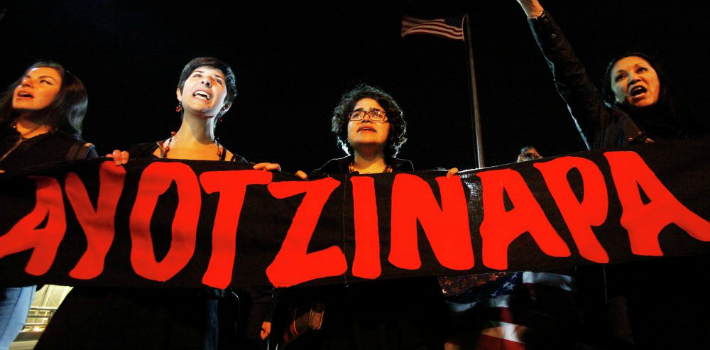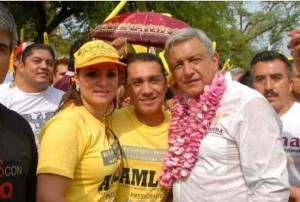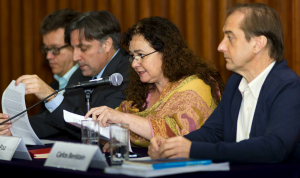
EspañolIn February 2015, a delegation of conflict-resolution experts from the Inter-American Commission on Human Rights (IACHR) began looking into the Ayotzinapa student massacre at the request of the Mexican federal government. However, a civil-society group is now raising questions over the IACHR’s chosen experts, claiming that the human-rights commission is carrying out a political agenda rooted in ideological bias.
The Citizen Council for Public Safety and Criminal Justice, a Mexican NGO presided over by law professor José Antonio Ortega, has criticized two IACHR experts for alleged misconduct: former Colombian prosecutor Angela María Buitrago and former Guatemalan prosecutor Claudia Paz y Paz.
In a press conference on November 18, the NGO claimed that the IACHR inquiry is politically and ideologically motivated, and has ties to guerrilla groups. According to the Council, the foreign experts are attempting to derail the investigation carried out by Attorney General of Mexico by twisting and fabricating facts.
Protecting an Opposition Leader?

Andrés Manuel López Obrador is a former presidential candidate for the progressive Party of the Democratic Revolution (PRD) and current leader of the opposition party National Regeneration Movement (MORENA).
While he has largely remained outside of the spotlight throughout the Ayotzinapa scandal, López Obrador openly supported the candidacy of José Luis Abarca, the mayor of Iguala who was charged with a role in the murders.
When the Mexican police initiated the mayor’s manhunt, López Obrador tried to distance himself from the scandal: “Luckily, and to the disappointment of my detractors, I do not know José Luis Abarca,” he claimed.
[adrotate group=”8″]
The IACHR investigation has focused primarily on the allegations that the Mexican army “forcefully disappeared” the 43 students.
According to the NGO, if the Mexican government accepts this theory, then all those who the police have so far arrested will be freed, and López Obrador will have cleared his name on his way to running for the presidency again.
Gang Rivalry
Nevertheless, the Council argues that the IACHR’s mission goes beyond protecting López Obrador’s image and friends, and also seeks to bury the true reason why the Ayotzinapa students traveled to Iguala, as well as how and why they were subsequently murdered.
In their report, the IACHR experts claim that the student activists went to Iguala to commandeer more buses in order to attend a march at the Mexican capital. However, they did not consider the claims that members of the Guerreros Unidos gang murdered the students after what they believed was an incursion into their territory.
According to testimony from members of the gang, they believed that members of a rival criminal group, Los Rojos, were among the students who traveled to Iguala.

A recorded phone conversation between student leaders expressing concern over Los Rojos operating inside the rural school supports the Council’s theory that the goal of this gang’s provocation was to put the Guerreros Unidos under the federal government’s watch. The Council contends that once the rival gang was dismantled, Los Rojos could then take over the profitable heroine trade that strategically flows through Iguala.
According to Mexican media, a DEA operation revealed that several buses carrying heroine and cocaine worth millions of dollars regularly departed Iguala toward the United States, before and after the massacre. The Council believes that one of the buses hijacked by the students could have been carrying drugs belonging to the Guerreros Unidos.
Los Rojos’s presence among the rural-students movement persists to this day, the Council assures.
Fair Investigation
On November 18, the Council presented its findings and analysis of the IACHR report, and expressed concern over the Commission’s investigation.
A Guatemalan prosecutor attended the press conference and highlighted Paz y Paz’s alleged misconduct during her tenure as Guatemala’s attorney general. “For the victims of Iguala, just like for any other, what we want is an objective investigation,” she argued.
“[Paz y Paz] has no moral stature, no professional and ethical qualifications, to belong to this group,” Ortega told reporters. “As long as she remains in the IACHR’s group, we’re not getting anywhere in establishing the facts. The [Mexican] federal government is throwing its money away.”
The IACHR has extended the delegation’s mission for another six months, so that their chosen experts can continue their investigation. The group is expected to present a followup report in April 2016.
 Versión Español
Versión Español












